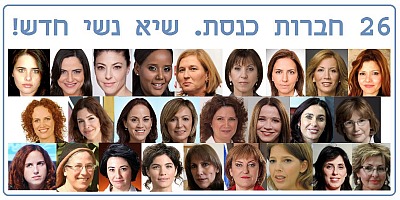
A record number of female MKs includes new faces, seasoned activists and rising stars.
Although champagne corks may not have popped in your community, Israel and the United States both made history recently by electing a record number of women to their national legislatures. I’m not saying 20 percent of U.S. Senate seats and 17.7 percent of the House of Representatives, or 22 percent of the Israeli Knesset—27 out of 120 members—qualify as feminist nirvana. But the seminal—or ovular—point is that women are making progress in the long, slow march to political equality.
On the Israeli scene, what interests me most is not just the number of women MKs but their ideological commitments and activist social agendas.
Some are already well known, such as Ruth Calderon, the charismatic Talmud scholar, who founded a secular yeshiva in Jerusalem and a Hebrew cultural center in Tel Aviv and who for years has been a forceful advocate for religious and cultural pluralism. Calderon is one of eight women, all new to the Knesset, in the 19-member delegation of Yesh Atid [There Is a Future], the party headed by former TV personality Yair Lapid.
Women are the leaders of three party delegations. Tzipi Livni, now minister of justice in the new government, heads the six-member HaTnua party (her five colleagues are men), made up of renegades from the centrist Kadima party. A former foreign minister, Livni ran this year on a platform favoring the resumption of negotiations with the Palestinians, environmental protection, women’s rights, gay rights and marriage equality. In the new government, she’s been handed the portfolio of negotiating with the Palestinians.
Shelly Yachamovich, a staunch social democrat and critic of political and financial elites, is the leader of the 15-member Labor party delegation. Although she angered many liberals during the election campaign by softening her opposition to settlements, she remains a determined advocate for social justice, workers’ and women’s rights and government transparency. And an exciting new face in Labor’s delegation is 27-year-old Stav Shaffir, best known for her key role as an organizer of the 2011 tent demonstrations and nationwide “cottage cheese” protests against high prices and income inequity. (In the absence of a viable peace process, domestic issues have moved front and center.)
Another woman, Zahava Gal-On, chairs Meretz, the left-wing party, three of whose six members are women. Gal-On has a long record of fighting for human rights and gender equity and against racism and human trafficking; she is a strong proponent of religious diversity and supports a two-state solution to the Israeli-Palestinian conflict. The other two Meretz women are new to the Knesset but not to the struggle: Michal Rozin, who has worked on rape prevention, and Tamar Zandberg, a Tel Aviv women’s rights activist.
These women (and others) are worth watching, but for my money, the most commanding new Knesset member and the woman most likely to achieve major transformations in public policy is Labor MK Merav Michaeli.
A former journalist and lifelong feminist activist, Michaeli made waves from the moment she set foot on the floor of the Knesset, not just because she’s a bona fide celebrity—a former television host, smart, dynamic, stunningly beautiful and the granddaughter of the famously assassinated Rudolf Kastner, whom some considered a hero for rescuing 1,670 Jews and others considered a traitor for negotiating with the Nazis—but because of an electrifying inaugural speech, which went viral, in which she laid out her vision of feminism.
Once the body was in session, she immediately organized the Knesset’s first-ever Women’s Caucus, persuading 26 of the 27 female MKs to sign on to a joint legislative agenda that will formulate and promote bills to enhance gender equality, advance women’s status in all fields, change laws affecting marriage and divorce and ensure women’s safety in the home, workplace and public sphere. (Faina Kirschenbaum, one of three female members of the Yisrael Beitenu delegation—Avigdor Lieberman’s party—was the only woman to decline membership.)
Getting 26 MKs to commit to work together across party lines is no small feat. But it’s clear that Michaeli and the caucus have a way to go before they’re taken seriously as a force to contend with. Why else would Prime Minister Netanyahu feel he could refuse their invitation to participate in a special discussion in the Knesset on International Women’s Day, March 8, without paying a political price?
To reverse this dismissive attitude and guarantee the Caucus’s political effectiveness, Michaeli has said she is establishing an “international feminist think tank,” which will provide her with advice, strategy and tools to create real feminist progressive legislation.
Not surprisingly, her devotion to women’s issues and economic justice is matched by a passion for peace—but her current views on the subject may sound counterintuitive for a card-carrying liberal. Born seven months after the Six-Day War, she deplores the fact that the military occupation of the West Bank has lasted for more than two-thirds of her nation’s history, that most adult Israelis have only known their country as occupiers, and that this oppressive role has become “normalized.” Yet though she opposes settlement expansion and favors a negotiated solution to the conflict, she thinks the United States should not pressure Israel to resume talks, because “the Netanyahu government will never participate in good faith.” She believes peace will come only when Israelis pressure all their leaders to make it happen.
If you’re interested in freshman MKs who are making things happen, Merav Michaeli is, in my opinion, the one to keep an eye on.
Letty Cottin Pogrebin’s new book, How to Be a Friend to a Friend Who’s Sick, has just been published. She is now working on a novel.
